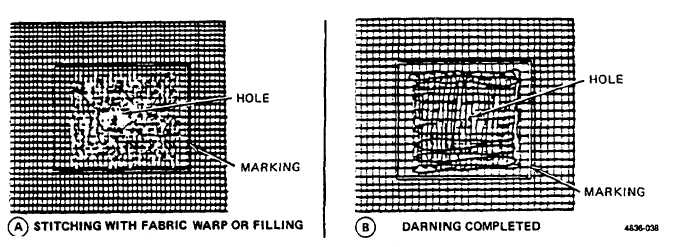ARMY TM 10-1670-276-23&P
AIR FORCE T.O. 13C5-29-2
NAVY NAVAIR 13-1-29
c.
Darning. (Refer to tables 2-2 and 2-3). Darning is a sewing procedure used to repair limited size holes, rips, and
tears in assorted air delivery items constructed from textile material such as parachute canopy gore sections. A darning
repair may be made either by hand or sewing machine, depending upon the method preferred and the availability of
equipment. However, a darning machine should be used to darn small holes and tears where fabric is missing. Darning
of previously patched material can be performed provided darning size limitations prescribed in the paragraph applicable
to the Item are not exceeded. A darning repair will be performed using the following procedures, as appropriate:
(1) Machine darning. Proceed as follows:
(a) Using an authorized marking aid of contrasting color, mark a square around the damaged area and ensure
that the marking is at least 1/4 inch back from each edge of the damaged area. The marking will be made
with the warp and filling of the material.
(b) Darn the damaged area by sewing the material in a back-and-forth manner, using size A or E nylon thread,
allowing the stitching to run with the warp or filling of the fabric (A, figure 2-36).
(c) Turn the material and stitch back and forth across the stitching made In (b), above, until the hole or tear is
completely darned (B, figure 2-36).
(d) If applicable, restencil Informational data, gore number(s), or Identification marks using the criteria in
paragraph 2-19.
Figure 2-36. Darning Method Using a Darning Sewing Machine.
(2) Hand darning. When repair of a hole or tear is made by hand darning, the darn should match the original weave
of the damaged material as closely as possible Hand darning will be performed as follows:
(a) Using an authorized marking aid of contrasting color, mark a square around the damaged area and ensure
that the marking is a least 1/4 inch back from edge of the damaged area. The marking will be made with the
warp and filling of the material.
(b) Using a darning needle and a length of size A or E nylon thread, begin darning at one corner of the marked
area. Working In the direction of the fabric warp or filling, pass the needle and thread back and forth through
the material until the opposite diagonal corner of the marked area is reached (A, figure 2-37).
2-53


